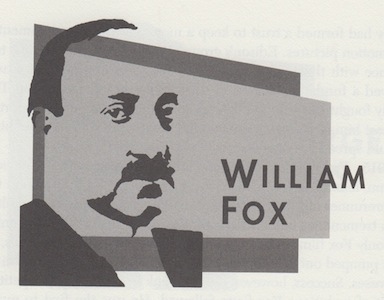Born: January 1, 1879, Tulchva, Hungary
Died: May 8, 1952, New York, NY
No second of twenty-four hours passed that the name William Fox was not on a screen in some part of the world.
—William Fox
A look at the life of William Fox is a look into the balance sheets of Hollywood. A successful garment broker, Fox took over a nickelodeon in 1904 and turned it into a chain of fifteen movie theaters, introducing organ accompaniment to silent films and pioneering other amenities for the comfort of patrons long before Sam Rothafel opened his famous palatial Roxy theaters. When profits in projection were small, Fox tackled distribution. In 1912, he started his own film rental company, which meant leasing pictures to many of the theater owners he had competed with for years. As he approached full capacity in the rental market, he decided to venture into film production. Slowly and methodically, Fox built the solid business that has today become a leading television network, an expansive cable giant and a blockbuster movie studio. He is a hero who saved motion pictures from the greedy clutches of Thomas Edison and transformed the first group of unknown actors into bankable stars.
As a trailblazing independent producer at the turn of the century, Fox began showing some success at playing all fields; he made movies from scenarios his wife had written, rented them to theaters and showed them in his own venues. But by 1913, Thomas Edison’s Motion Picture Patents Company had formed a trust to keep a monopoly on the equipment used in making motion pictures. Edison’s group was willing to use violence to ensure compliance with their rules, even threatening to dynamite the Fox offices. Fox played a fundamental role in the dissolution of the Edison Trust. He resolutely fought the group in court, almost entirely without support, and his victory cast him as a hero in the young industry. From that time, his leadership would spread to every corner of the film world.
By 1915, Fox had a monopoly himself: his empire included strong production, leasing and exhibition units that merged into Fox Film Corporation, a forerunner of 20th Century Fox studios. Soon, Fox was a multimillionaire with tremendous influence during the studio heyday of the silent era. He showed only Fox films in Fox theaters, and by the end of the 1920s, his story factories pumped out fifty films a year, bringing in over $200 million worth of ticket grosses. Success, however, did not bank Fox’s fiercely competitive fires.
A host of ambitious Fox firsts followed. He was the first to nurture the careers of his top talent through clever publicity stunts; and his efforts made stars of silent actors Theda Bara, Betty Blythe, William Farnum and Tom Mix. He was the first to attempt sound films. He was also the first to import features from overseas, the most notable being the famous F.W. Murnau film Sunrise (1927).
On the heels of Sunrise, Fox sought to acquire more theaters and more production facilities. He bought a major stake in MGM and secured 45 percent of Britain’s most productive studio, Gaumont. His appetite for companies continued, and he attempted a takeover of Marcus Loew’s studio. With an eye on the next craze in film, he invested heavily in early wide-screen processes of the twenties and ramped up for sound films by retrofitting more than eleven hundred theaters at the height of the Depression.
In 1929, independent studios lobbied for antitrust legislation against Fox. Seeking to prohibit the lockout of their films from Fox theaters, they successfully broke the stranglehold he had on the majority of theaters nationwide. Fox fought various court battles with all of his resources, until his bankruptcy in 1936. For attempting to bribe a judge at his bankruptcy hearing, he was sentenced to a Pennsylvania prison, where he served six months. He then retired from the industry forever.
With his reputation blemished, he encouraged novelist Upton Sinclair to conduct a survey of the movie industry and determine whether Fox was a hero or goat. In 1933, Sinclair wrote a book about the case called Upton Sinclair Presents William Fox and paid for its publication. The dour piece on Hollywood, which attacked the executives who had targeted Fox, restored the luster of the theater magnate’s fascinating accomplishments and remains a fitting testament to his contributions.
To read all the republished articles from ‘The Film 100,’ go to Reintroducing the Film 100 here on Keyframe.





